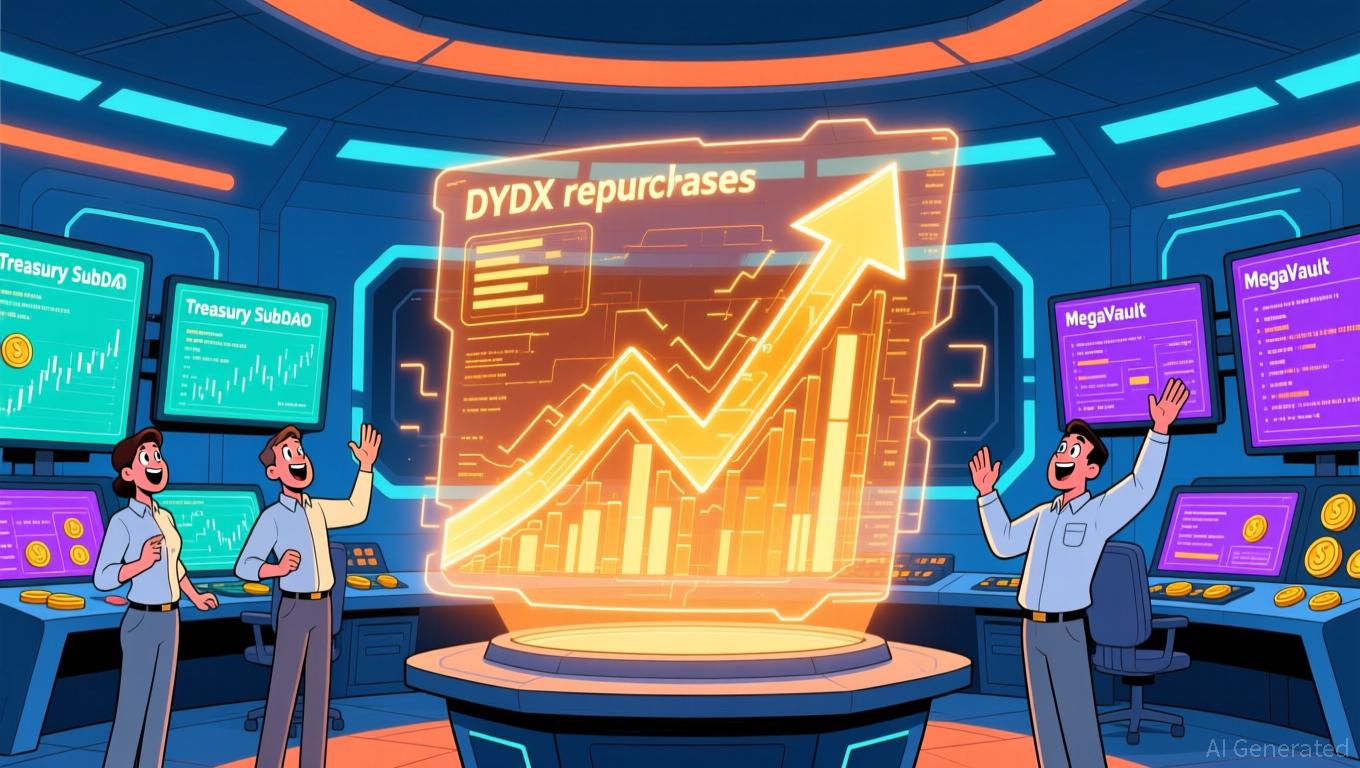dYdX Implements 75% Buyback: Synchronizing Holder Rewards with Platform Growth
- dYdX community approved 75% protocol fee allocation for token buybacks, up from 25%, via a 59.38% voter majority on November 13, 2025. - The revised distribution aims to reduce DYDX supply, enhance scarcity, and align token holder incentives with platform performance through automated, transparent buybacks. - 5% of fees now fund Treasury SubDAO and MegaVault for ecosystem development, balancing supply reduction with staking incentives and research-driven growth. - Analysts highlight this as a DeFi govern
The
This move demonstrates a deliberate strategy to better align token holder interests with the platform’s success. By linking buybacks directly to protocol revenues, dYdX intends to

Proposal 313 marks a shift away from conventional corporate buyback practices. Rather than relying on executive decisions as in centralized organizations, dYdX’s system is fully automated and open, with every transaction contributing to the buyback pool
Experts observe that this decision could influence future DeFi governance models. By
The dYdX team shared the update on X, stating, "
Disclaimer: The content of this article solely reflects the author's opinion and does not represent the platform in any capacity. This article is not intended to serve as a reference for making investment decisions.
You may also like
Aave News Today: Aave’s No-Fee Initiative Brings DeFi Access to All Across Europe
- Aave Labs secures MiCA approval in Ireland, enabling zero-fee euro-to-crypto conversions via its Push service across the EEA. - The fee-free model challenges traditional fintech and CEXs, aiming to reduce DeFi adoption barriers by eliminating transaction costs. - Ireland's regulatory environment attracts DeFi firms like Aave, following Kraken's MiCA authorization and Aave's Stable Finance acquisition. - With $312B stablecoin market cap in 2025, Push's $542M 24-hour volume highlights its role in scaling a

Post-FTX digital asset exchanges simplify futures offerings to comply with regulatory requirements
- Binance delisted RUNEUSD futures to align with post-FTX regulatory demands and evolving user preferences. - The move follows industry-wide transparency efforts like proof-of-reserves initiatives after FTX's 2022 collapse. - Post-FTX trends show growing demand for DeFi solutions and institutional-grade crypto products with enhanced compliance. - Challenges persist in balancing innovation with regulation as exchanges like Binance recalibrate strategies amid shifting market dynamics.

Bitcoin News Update: Bitcoin's Death Cross and Global Political Strains Raise Bearish Concerns, Yet Institutional Activity Inspires Optimism
- Bitcoin's recent $105,000 drop triggered bearish signals like the "death cross," raising concerns about a prolonged downturn amid weak institutional/retail demand. - ETF data shows mixed investor sentiment, with $1.1T inflows in U.S. Bitcoin ETFs but $2.5B outflows from Grayscale's Mini Trust, highlighting market fragmentation. - U.S.-China Bitcoin dispute over 127,000 stolen coins and frozen liquidity exacerbates uncertainty, while DeFi integration and miner diversification offer structural support. - A

Bitcoin News Update: Institutions Reduce Bitcoin ETF Holdings, Boost Solana Investments Amid Rising Altcoin Interest
- Bitcoin ETFs saw $870M outflows as institutions offloaded positions amid macroeconomic uncertainty and profit-taking pressures. - Ethereum ETFs lost $438M while Solana-based products bucked trends with $118M inflows, reflecting growing institutional demand. - U.S. ETFs recorded $1.22B outflows, contrasting Germany/Switzerland inflows and gold/energy sector gains of $363M and $427M respectively. - SEC's in-kind redemption rules reshaped institutional Bitcoin ETF participation, with Blackrock's IBIT holdin
